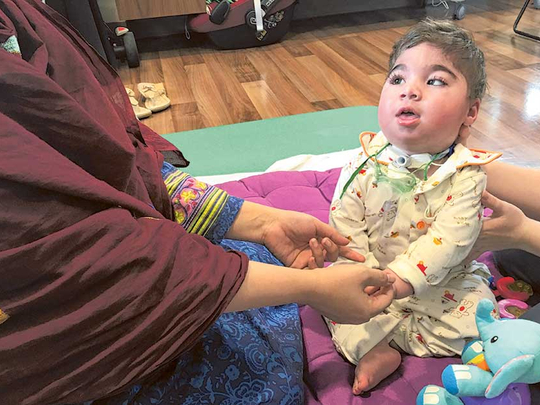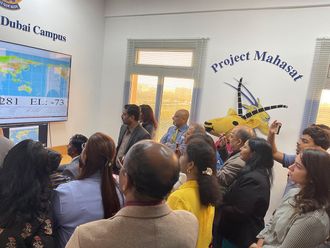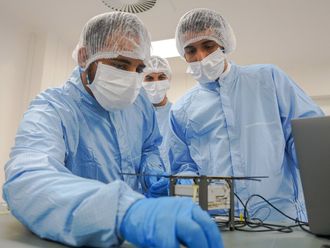
Nada Al Ansari and her husband were ecstatic to expect their third child, “the most wanted one”. Having had two perfectly healthy children previously, and a normal pregnancy, they had no reason for concern when the day of delivery arrived.
But when baby Ali was born in the Abu Dhabi hospital’s delivery room, alarm bells started ringing. He did not cry much or move his body when the doctor carried him.
“When they carried him, he just lay there with his body limp. Babies tighten their muscles and roll inwards to protect themselves when you carry them [from underneath] but Ali didn’t, he was just limp. They took him away immediately for observation,” said Nada. “I started crying. I asked my husband where my baby was. He couldn’t speak at first, but then told me not to worry, and that the doctors would bring him back soon.”
After observation and some tests, they told Nada that Ali was hypotonic, a condition in which the muscles have an abnormally weak tone.
Ali had other symptoms such as a slightly smaller head, dissimilar ears and unusually dry skin. An MRI scan revealed abnormalities in his brain. And as time went by, his parents realised he had very poor eyesight.
“The medical staff would tell me that it was probably a syndrome but they couldn’t tell me exactly what it was. They knew it was not Down syndrome but there were no answers,” Nada said.
Ali also made a whistling noise when he breathed, his oxygen levels dropped dramatically when he was fed and he had refluxes.
Ali was diagnosed with laryngomalacia, which was the cause of his abnormal breathing and feeding. It is a birth defect that affects breathing due to a floppy tissue above the vocal cords that falls into the airway.
According to Nada, although many children diagnosed with laryngomalacia can make a full recovery by the time they are about six months old, they were told Ali’s case was far too severe. When Ali was a month old, he underwent laser treatment to remove the excess floppy tissue at a speciality hospital in Ali Ain. Although the operation was a success, it did not ease Ali’s breathing completely.
After Ali recovered from the laser treatment, it was decided that he be transferred to another hospital, some 200 kilometres away in Abu Dhabi. His condition was deemed too dangerous to travel without oxygen support and he was put on a ventilator for the journey.
Ali had been on the ventilator for 24 hours, but when they tried to remove it, his body had become too dependent on it and they could not detach the device, Nada said. “His oxygen levels would completely drop when they tried to take him off the ventilator.”
By the time Ali was about three months old he was connected to a heart monitor, an oxygen machine that required suction of the saliva about every 20 minutes, a cream had to be applied every two hours on his entire body for extremely dry skin and he had to undergo regular physiotherapy to improve his muscle tone.
“I was afraid to take him home. He needed constant supervision. I was afraid that I might do something wrong. I also have two small children at home and couldn’t give him the continuous attention that he needed. I kept thinking what if I fell asleep or something,” said Nada.
The family searched for the best possible solution for Ali’s situation. They found the answer in a paediatrics rehabilitation centre. “We decided to bring him to Cambridge Medical Rehabilitation Centre [CMRC] in Abu Dhabi. It was very tough to have him away from us but we knew we were making the right decision.”
As Ali made steady progress his family finally received some answers about his condition. He had a genetic disorder with a defect in his SNAP29 gene. Ali was just about five months old at that time. “They said it was because my husband and I were related — we are cousins,” Nada said.
Samples taken from Ali and his parents months earlier were tested at a lab in the US. The results said that the gene defect was the cause of a list of medical conditions including cerebral dysgenesis (abnormal brain development), neuropathy, ichthyosis (genetic skin disorder) and palmoplantar keratoderma syndrome.
Ali is now one year and four months old. He is still being cared for at the CMRC, connected to an oxygen machine, a heart monitor and a PEG tube that allows feed to go directly to his stomach. Ali is fighting hard, and he is slowly improving.
He has gone from barely moving his body to rolling on his stomach, lifting his arms and trying to kick his legs, which Nada calls “jumping”, a game that he enjoys even if it sends the heart monitor into a beeping frenzy. “I cried the first time I saw him roll. But this is all because of constant support and care he is receiving.”
Nada said Ali had to be taught the basics such as how to touch his face or even how to taste food. “Our biggest concern right now is for Ali to sit. That is what we are working on. If he sits we think his breathing will improve and he will be able to do a lot more.”
Nada said repetition and continuous therapy is the key to his progress and Ali receives daily therapy to help him achieve his targets. She believes people in the Middle East do not have the right awareness about rehabilitation and its importance. “Even I thought it was something that was related to people on drugs or those with psychological issues. My ideas about rehabilitation have completely changed. I want more people to be aware of how important it is to receive it.”
Although Ali’s rehabilitation has helped him tremendously, his absence at home does take its toll on the family, with his mother admitting that they have not had any vacation since his birth. A day trip to Dubai is as far as they are willing to be from Ali.
“We miss him a lot. I see him every day around 12.30pm and stay with him until about 3pm. Then I go home and attend to my other children, their homework, dinner and so on. Once they are asleep, my husband and I visit Ali again around 9.30pm and are there until he, too, goes to sleep. I miss him when I don’t see him ... It’s how any mother feels about her child.”
Ali’s future capabilities are unclear at this point. His parents and the medical staff are taking his progress one day at a time but Nada said her only hope for Ali is for him to get well enough to be by her side.
“I don’t know what to expect when he grows up and I don’t expect anything. My only hope is to see him with me, close to me. I don’t care if he is not able to go to school,” she said, wiping the steady stream of tears. “God tests you with the ones you love the most. He is the favourite, so God is testing us.”













